More about Resourcing
-

Better Future Series: ADAPT Your Generosity
by VRcurator | March 27, 2020In these no-cost, 30-minute daily leadership moments, our team of Navigators is delivering timely content designed to bring breakthrough clarity in a season of unprecedented uncertainty. When will we shift from the "safe at home" posture to the "back to church" new normal? For these two sessions, Auxano Senior Lead Navigator and Director of Resourcing Greg Gibbs unpacks questions and concerns around church finances.

-

What Happens When You Can’t Pass the Plate?
by Greg Gibbs | March 16, 2020Coronavirus Concerns in the Church The last stat I heard about digital giving in the Church was that about 75% of churches have the option, but only 25% of giving actually happens via electronic means. Even if this statistic is slightly askew, the reality is that many churches are facing some hair-raising days.
-

Commit to Generosity Now By Starting Wherever You Are
by VRcurator | March 6, 2020A huge difference exists between a legacy and an inheritance. Anyone can leave an inheritance.
-

When and How to Teach About Money
by Art Rainer | February 10, 2020How often does your church teach about money? For some churches, the answer is rarely or never. The topic is avoided.
-

6 Tips in Leading Your Next Capital Campaign
by David Putman | January 30, 2020I was given a campaign manual on my first day as an XP. That’s right, I got my first assignment and it was to lead our growing church plant through a capital campaign that would allow us to double our space.
-

Why “Decreasing Giving” News Shouldn’t Paralyze You
by Greg Gibbs | January 28, 2020It should come as no surprise to pastors and ministry leaders that the traditional ways we track and predict things are going the way of the fax machine. And the articles and polls are coming out virtually every week right now: Giving is down in the church! Ugh.
-

5 Key Insights for Church Capital Campaigns
by Kent Vincent | January 24, 2020After 21 years of local church ministry, I’m excited to be a part of the Resourcing Team of Auxano as a Lead Navigator. Over the years, I’ve had the opportunity to serve on executive teams of great churches ranging in size from 300 on one campus, to 10,000+ on five campuses.
-
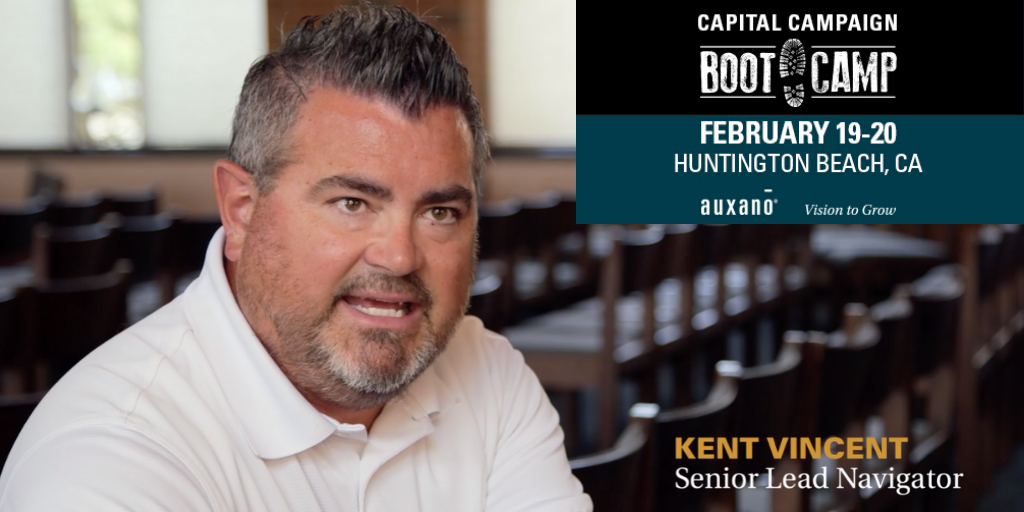
Auxano’s Capital Campaign: Design-Through-Discipleship
by VRcurator | January 22, 2020Here's your chance to learn more about Auxano's Capital Campaign Boot Camp! Kent Vincent and Greg Gibbs will be team-coaching the sessions over the two days. We have been around the country collecting “best practices” and want to share them with you.

-

The Captivating Connection Between Disciple Making and Capital Campaigns
by Greg Gibbs | January 21, 2020Among the reasons I am still committed to the “dust up” that campaigns create is that they raise way more than financial support. A discipleship-based campaign raises the faith temperature in the hearts of people in a way that is life-changing.
-
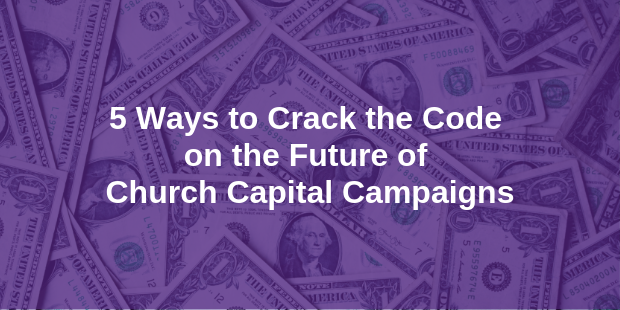
How to Crack the Code on the Future of Church Capital Campaigns
by Greg Gibbs | January 17, 2020Here’s a little context for you: I’ve been helping lead out Capital Campaigns for almost 20 years, which means I’m clocking in at 100+ campaigns, including doing them (successfully!) during the 2008-2010 economic recession. Oh, and by the way…I live near Detroit! Believe me, we not only felt the sting for those years, but have experienced the economic PTSD that goes along with that moment in history.
-

Three Non-Negotiables for Raising Funds for the Church
by Greg Gibbs | January 16, 2020When it comes to raising funds for your church, consider the following three actions to be non-negotiable. 1.
-
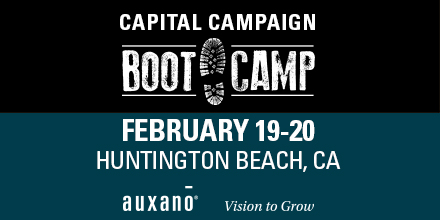
Is It Time for You to Plan a Capital Campaign?
by VRcurator | January 15, 2020Is it time to invest in a big way in your future? Let’s plan a Capital Campaign together! During 2020, Auxano will be leading a tell-all two-day session of the secrets of capital campaign consultants. Let’s look right at the consultant’s playbook.
-

Generospitality Part Four – Three Terrible Messages Your Welcome Team Sends
by Bryan Rose | December 24, 2019“‘For I was hungry and you gave me something to eat; I was thirsty and you gave me something to drink; I was a stranger and you took me in;” – Matthew 25:35 CSB In your church, love begins every week with your welcome. From your church’s website to your worship bulletin, every step of your hospitality systems will either speak to the love found in your body, or it will reveal one of three conflicting shadow mindsets.

-
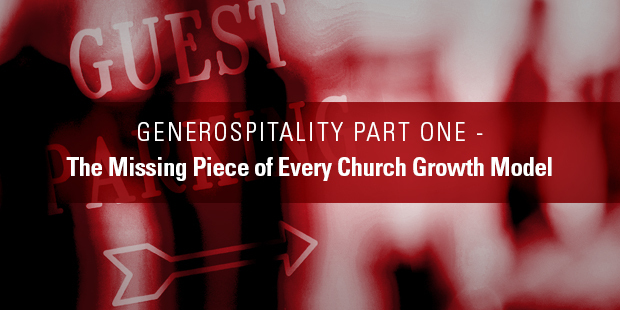
Generospitality Part One – The Missing Piece of Every Church Growth Model
by Bryan Rose | November 29, 2019Now all the believers were together and held all things in common. They sold their possessions and property and distributed the proceeds to all, as any had need.
-

For the Love of Money: Part Three – Give
by VRcurator | July 26, 2019John Wesley, the founder of the Methodist Church, preached many times over the course of his life on the topic of money. To take Wesley's sermon “The Use of Money” seriously would require a whole new way of thinking about how we earn and use money in a world in which others are in want.
-

Out of The Heart… How Giving Reflects Belief
by Michael Kelley | July 22, 2019"You evil, lazy slave!” These are the words the master had for the third servant in Jesus’ story recorded in Matthew 25. Each had been given a substantial sum of money; each had made choices about what to do with it.
-

For the Love of Money: Part Two – Save
by VRcurator | July 18, 2019John Wesley, the founder of the Methodist Church, preached many times over the course of his life on the topic of money. To take Wesley's sermon “The Use of Money” seriously would require a whole new way of thinking about how we earn and use money in a world in which others are in want.
-

Four Ways Great Commission Vision Takes Great Commission Resources
by Rick Warren | July 17, 2019There are tens of thousands of churches in America that haven’t baptized anyone in at least a year. Even though The Great Commission and The Great Commandments are core to who we are as the church, we’re struggling to engage our culture with the Gospel.
-

Is Giving to a Cause, Not the Church, Even Biblical?
by James Emery White | July 17, 2019“Millennials want to give to a cause. ” Heard that one? Of course you have.
-

For the Love of Money, Part One: Earn
by VRcurator | July 11, 2019John Wesley, the founder of the Methodist Church, preached many times over the course of his life on the topic of money. To take Wesley's sermon “The Use of Money” seriously would require a whole new way of thinking about how we earn and use money in a world in which others are in want.
-

The Radical Blessing of Creating Surplus Giving
by Todd McMichen | July 10, 2019If you haven’t had your third cup of coffee this morning, I want to suggest you stop reading this blog and go get it. Then close your office door, crank up the music, and get ready to dive into a radical tool to help you create surplus thinking.
-
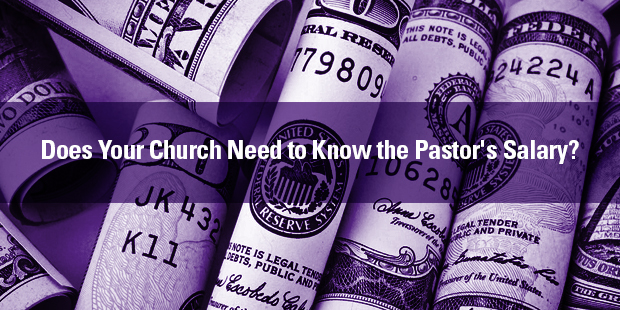
Does Your Church Need to Know the Pastor’s Salary?
by Thom Rainer | July 8, 2019This question comes to the Church Answers’ team and me a few times a month. It often evokes some pretty strong emotions.
-
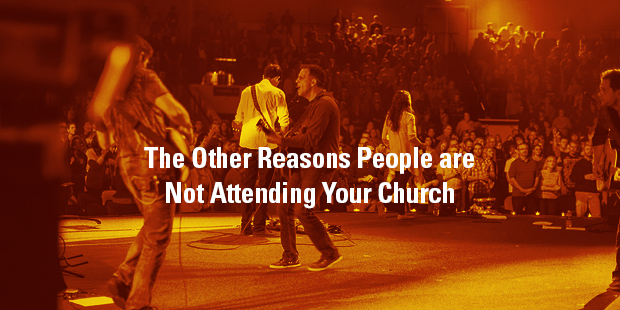
The Other Reasons People are Not Attending Your Church
by Dan Reiland | July 1, 2019There’s a big difference between missing a Sunday and disconnecting from your church. Vacations, travel for work, and kids have travel ball.
-

Generosity In Genesis: Four Names to Know
by Todd McMichen | June 28, 2019I get so inspired when I think about how the Bible leads with the generosity story right from the very beginning. It doesn’t arrive after the law or when the Temple needs to be built.
-

Generosity Killers, Part Two: Debt
by VRcurator | May 2, 2019Many of us want to do more and be more. We want to make a difference in the world.
-

Three Reasons Generosity Matters
by Philip Nation | April 30, 2019In 1993, my 9th grade algebra teacher said something like: You’ll use algebra constantly for the rest of your life. I’d like to say that I recently completed an unbroken streak of 35 years of having never used algebra… except for this illustration.
-

Generosity Killers Part One: Materialism
by VRcurator | April 17, 2019Many of us want to do more and be more. We want to make a difference in the world.
-

Four Biblical Principles of Giving
by Art Rainer | April 9, 2019What does it mean to give? How does it look? You may know intuitively that you should give but not know much beyond that. The good news is that the Bible tells us what our giving should look like.
-
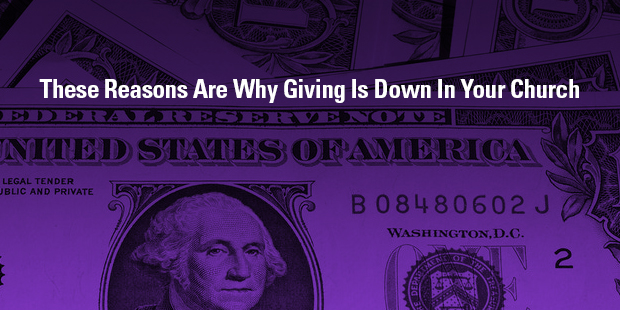
These Reasons Are Why Giving is Down in Your Church
by Thom Rainer | April 8, 2019You are trying to comprehend why the giving levels in your church are down. You may know several possibilities, but you aren’t certain.
-

Developing Generous Children, Part Two: Nurture Financial Learning Through Daily Living
by VRcurator | February 28, 2019Humans tend to obsess over what they possess – or desire to possess. Consider the following thoughts by Craig Bloomberg, professor of New Testament at Denver Seminary: The poor strive to acquire enough to survive Those whose basic needs are met naturally want more as a cushion The middle class is discontent because they see people with more The affluent compete with their peers in material one-upmanship Advertising bombards us constantly, creating a consumer culture designed to make us feel shortchanged and always looking to acquire the next possession.
-

6 Ways to Maximize Your Budgeting Process
by Eric Geiger | February 22, 2019Some people believe a budgeting process is a waste of time. I don’t mean the people who have a visceral reaction to budgets and strategy, but there are prudent and wise leaders who view a long budgeting process as bad stewardship.
-

The Dangerous Moment When Attendance Drops but Giving Stays Strong
by Sam Rainer III | February 15, 2019I’ve noticed a recent trend among churches. The evidence is more anecdotal, but I have no doubt the phenomenon is occurring on a national scale.
-

This is the Most Toxic Threat a Church Member Will Make
by Thom Rainer | February 15, 2019One of the most toxic statements a church member or group of church members can make is, “We pay the bills at this church. ” Not only is it unbiblical, it is clearly divisive.
-

Developing Generous Children, Part One: Create a Family Financial Vision
by VRcurator | February 15, 2019Humans tend to obsess over what they possess – or desire to possess. Consider the following thoughts by Craig Bloomberg, professor of New Testament at Denver Seminary: The poor strive to acquire enough to survive Those whose basic needs are met naturally want more as a cushion The middle class is discontent because they see people with more The affluent compete with their peers in material one-upmanship Advertising bombards us constantly, creating a consumer culture designed to make us feel shortchanged and always looking to acquire the next possession.
-

How to Fund Your Ministry Vision
by Brandon Cox | February 12, 2019What’s the ONE subject almost no church leader enjoys talking about? Yep. Money.
-
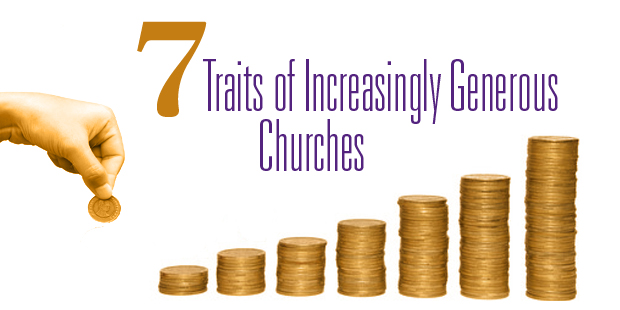
7 Traits of Increasingly Generous Churches
by Thom Rainer | February 10, 2019One of the key metrics of financial giving in a church is per member giving: What is the average giving per member or per attendee? Per member giving is often masked by fluctuations in attendance and membership. The most effective measure is to calculate the average giving per member.
-
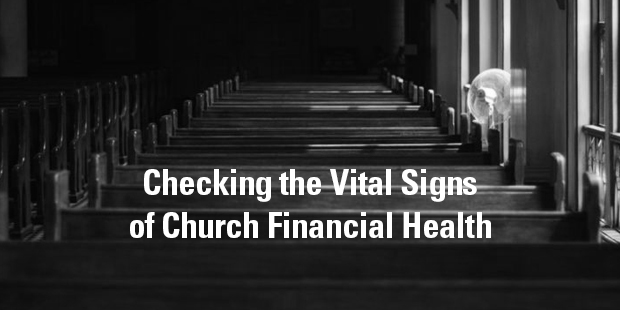
Checking the Vital Signs of Church Financial Health
by Art Rainer | December 17, 2018I have seen many churches in financial distress. It is a sad situation to witness.
-
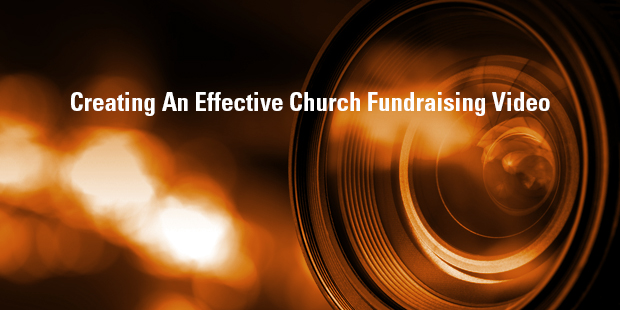
Creating an Effective Fund Raising Video
by Greg Gibbs | December 6, 2018Many churches are investing time and money in a video – or more than one – that tells the story of their need for infused capital beyond the regular budget. Others are using for a Year-End-Giving campaign to inspire people about the accomplishments of the year.
-
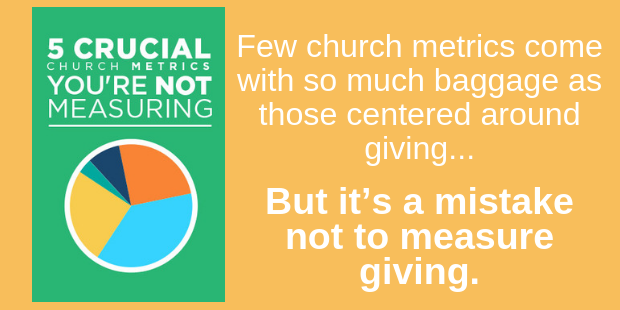
The Critical Metric You’re Not Measuring – But Should Be!
by Tobin Perry | September 19, 2018(NOTE: This post was excerpted from the ebook “5 Crucial Church Metrics You’re Not Measuring (But Should Be!)”) Few church metrics come with so much baggage as those centered around giving. We simply don’t know how far to delve into the generosity (or lack thereof) of our congregation.
-

The Generosity Revolution, Part 2: Change the View
by VRcurator | July 26, 2018How can you lead a generosity revolution in your church? Earlier this month we celebrated Independence Day in the U. S.
-

Right Idea, Wrong Goal… Where Financial Freedom Goes Wrong
by Todd McMichen | July 25, 2018If I were to list the most common financial goals that are often repeated across the nation in financial small groups, seminars, and sermons, I am confident I know the two that are listed the most. One is a goal most pastors dream of, and the other is a dream held by those in the the pursuit of stronger financial health.
-

The Generosity Revolution Part 1: Fan the Flames
by VRcurator | July 12, 2018How can you lead a generosity revolution in your church? We recently celebrated Independence Day in the U. S.
-

One Change in Your Financial Approach that Changes Everything
by Todd McMichen | July 12, 2018Many pastors tell me they hate fundraising. I think there’s a legitimate reason for that.
-

The Power-Full Life Part 2: Blessed to Be a Blessing
by VRcurator | April 27, 2018Generosity is a testimony of God’s grace in your life. It affirms your faith and it is how God desires to work around the world.
-
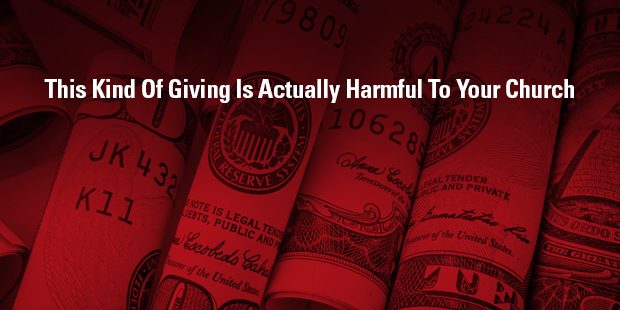
This Kind of Giving is Actually Harmful to Your Church
by Thom Rainer | April 24, 2018If there is a topic that reaches me with frequency, it is the topic of church members designating funds. And the common theme is one of regret.
-
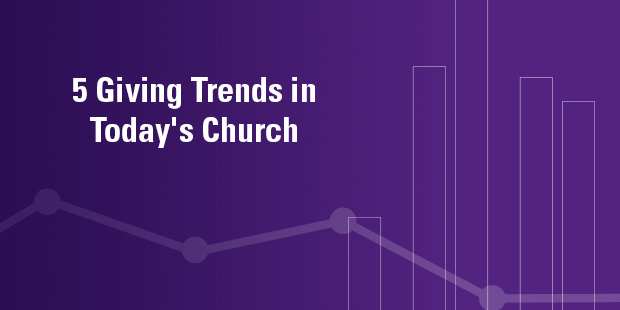
Five Giving Trends in Today’s Church
by Sam Rainer III | April 16, 2018Much about church giving is changing. Worship attendance, conversions, and baptisms are often the most scrutinized metrics, but giving trends are close behind.
-

The Power-Full Life, Part 1: Downsize to Maximize
by VRcurator | April 13, 2018How can you experience the transforming power of a generous life? Generosity is a testimony of God’s grace in your life. It affirms your faith and it is how God desires to work around the world.
-

7 New Approaches to Talking about Generosity
by Carey Nieuwhof | February 28, 2018So let me guess, every time you need to talk about money in church, you wince. And you’re the leader.
-
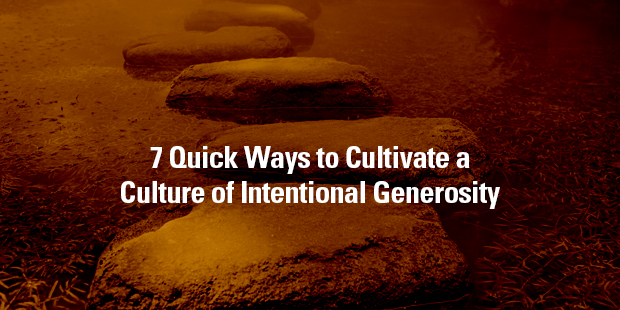
7 Quick Ways to Cultivate a Culture of Intentional Generosity
by Church Community Builder | February 26, 2018While most people want to give and want to be generous, it’s important to recognize that inspiring people to give is really only half the equation. Somehow, churches must find a way to bridge the gap between good intentions and active generosity, helping to move people from wanting to give to actively giving.
-

You Can’t Outgive God
by Rick Warren | February 20, 2018God came up with the idea of multiplication. If you give him your time, he multiplies it.
-

How Church Generosity Can Impact Your Community
by VRcurator | February 16, 2018How can we ensure our giving helps those in need instead of hurting them? Americans continue to give to charitable organizations at a record pace. Charitable giving in 2015 was over $373 billion, according to The Giving Institute, surpassing the previous year’s amount by over four percent.
-

A Perspective on Generosity that Engages Heart and Mind
by VRcurator | February 2, 2018How can we ensure our giving helps those in need instead of hurting them? Americans continue to give to charitable organizations at a record pace. Charitable giving in 2015 was over $373 billion, according to The Giving Institute, surpassing the previous year’s amount by over four percent.
-

Growing Churches Regularly Leverage This One, Simple Idea
by Rick Warren | December 21, 2017No other institution on earth has the potential to change the world and address global issues as the local church. No force on earth is as unstoppable as the local church when it is functioning as a unified body of believers.
-

Pastors and Their Personal Finances…Why the Struggle is Real
by Eric Geiger | December 18, 2017Of the more than 700 pastors’ spouses surveyed in a recent LifeWay research project, more than half expressed that their income from the church is insufficient, and more than two-thirds are concerned they do not have enough saved for retirement. Why is this? Why do so many families in local church ministry struggle financially? While there are likely many reasons, I want to offer four possibilities—three of which place responsibility on the church for not providing enough support and one that places responsibility on the pastor for not being a wise steward.
-

5 Lessons about Church Giving that Amazon Can Teach Us
by Rich Birch | December 14, 2017Way back in the mid-1990s there were a lot of companies gunning to be the leader in “online retailing. ” (Who remembers Pets.
-
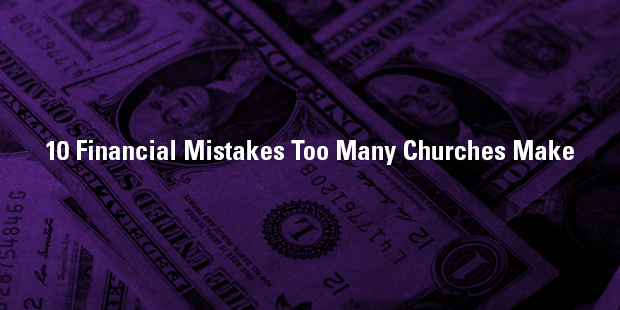
10 Financial Mistakes Too Many Churches Make
by Dan Reiland | December 5, 2017The intersection of faith and finance is never easy to navigate as a local church leader. The topic of money is inescapable for anyone who leads a church, so while many of us would rather lead people toward Jesus, we must also embrace the truth that the functions of a local church do not operate for free.
-

Money Matters: Wisely Budgeting for Growth
by Eric Geiger | July 27, 2017Budgeting is a great time to develop a plan, with the right leaders, for spending. I prefer approaching budgeting with a growth mentality.
-

Money Matters: Cultivating Generosity Every Day
by VRcurator | July 21, 2017Does asking for money and discussing financial needs not feel very spiritual at times? Ministry income is a subject many church leaders struggle to think about from a spiritual perspective. We often see fundraising as a necessary but unpleasant secular activity to support spiritual action.
-

Moving from Financial Deficit to Abundance
by David Putman | July 17, 2017Somewhere I picked up the line, “Your vision will always outpace your resources. ” Can you relate? Do you find yourself in the position where you always need more money for more ministry? For the majority of us the answer is a resounding YES! When it comes to money there always seems to be more month than money.
-

Answer These 5 Questions to Help Steward the Resources God Has Given You
by Dan Reiland | July 13, 2017When it comes to church, revenue and redemption don’t feel very closely connected. Theologically speaking they aren’t, salvation is a free gift of God.
-

Money Matters: Aligning Priorities Toward Eternity
by VRcurator | July 7, 2017How can we cultivate a “get to give” not a “got to give” culture of generosity? It is inspiring to watch generosity flourish. Here are four simple principles regarding generosity: God is a very generous God.
-
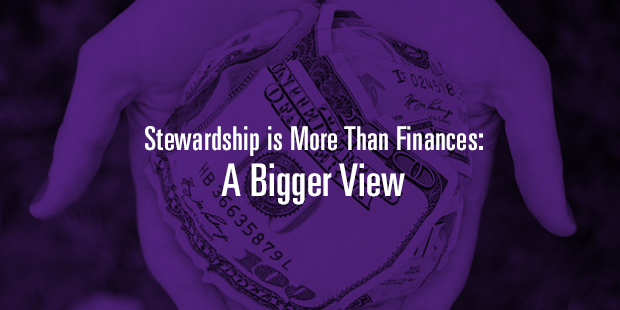
Stewardship is More Than Finances: A Bigger View
by Michael Kelley | July 5, 2017When we think about stewardship, we think primarily about money. That’s a good and right thing, because when we think and talk about money, we are patterning our messages after those of Jesus.
-

Discover the Genius of Generosity
by VRcurator | April 14, 2017How can you connect with high-capacity givers in your church who are not yet giving without appearing greedy? It’s right there in the Acts 2 account of the early church. As disciples are made, giving is a natural overflow.
-

6 Keys to Growing Personal Generosity
by Brandon Cox | April 13, 2017Is it really possible to just stop being poor? Not always. There are places in this world where there are no opportunities to pursue, no jobs to work, and no resources to multiply.
-

Are These Offertory Trends Taking Place at Your Church?
by Thom Rainer | April 6, 2017For most Protestant churches, the offertory is the time of worship where church members make financial gifts to God through the church. It may be combined with special music or announcements, but the central theme is giving to God.
-

Breaking the Generosity Conversation Barriers
by VRcurator | February 17, 2017How do you connect with high-capacity givers in your church who are not yet giving without appearing greedy? It’s right there in the Acts 2 account of the early church. As disciples are made, giving is a natural overflow.
-

When Vision and Discipleship Meet the Budget
by Todd McMichen | February 9, 2017The church budgeting process does not rank high on the list of the most motivating and inspiring experiences in a minister's life. Pastors will line up to deliver a message, shepherd the hurting, pray for wayward, and lead the body forward.
-

Is Up and to the Right, Always Right? Understanding Church Giving Increases
by Dan Reiland | February 7, 2017I had a conversation with a pastor last week who told me that the giving in his church was on the rise and he asked how he should interpret that. That’s a sharp pastor.
-

3 Hard Decisions of Generosity
by Todd McMichen | February 1, 2017The desire for a more generous culture is an inspiring one. After all, we all need more resources released into ministry.
-

The One-Kingdom Approach to Generosity
by VRcurator | December 30, 2016Is your congregation stuck seeing generosity as what they cannot give rather than why or how they give? Generosity is a way of living that involves one’s daily activities, values and goals for life, and the use of all possessions. It begins with recognition of God as Creator of all things, and our position as steward of some things.
-

Stewardship is a Ministry Leader Must
by Eric Geiger | December 27, 2016In his letter to Titus, the apostle Paul called the overseer “God’s administrator” or “God’s steward” (Titus 1:7). Ministry leaders are stewards, not owners, as Jesus owns His Church.
-

Generosity Starts at the Top
by VRcurator | December 23, 2016How do I keep our budget from turning inward? For where your treasure is, there your heart will be also. - Matthew 6:21 Jesus directed these words to the crowds at the Sermon on the Mount, but their truth is just as appropriate for your church today.
-

4 Ways to Grow in Your Personal Generosity
by Todd McMichen | December 22, 2016Generosity is not an event or an emphasis. There's no secret sauce or hidden tricks.
-

2 Challenges in Growing a Generous Church
by Eric Geiger | December 19, 2016Give some thought to what it would be like to be a part of a generous church, led by a generous staff, overflowing with generous people. While generous people can be described in many ways, I will limit their attributes to this statement: A generous person exudes an overall positive disposition, lives with sensitivity to what is going on around them, and is ready to respond to needs.
-

Seven Actions to Lead Your Church to Financial Fitness
by Todd McMichen | December 12, 2016Is your church financially fit? When asked this question most church leaders usually have a quick gut level response between two extremes. They either respond with a confident “yes” because the church has more money than it spends every year.
-
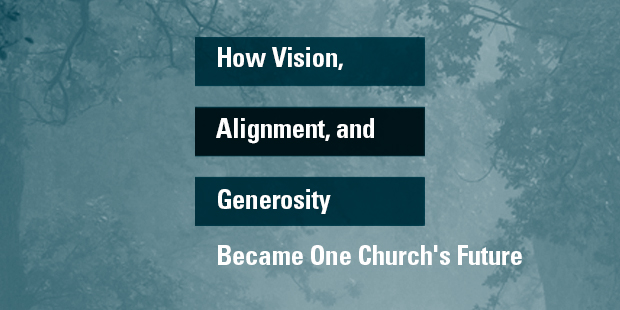
How Vision, Alignment, and Generosity Became One Church’s Future
by Todd McMichen | November 30, 2016About two years ago we received contact from Church at The Mall in Lakeland, FL. They had just launched an initiative with seven missional components.
-

Generosity for Everyone
by Todd McMichen | July 29, 2016It has been an exciting summer around my house. I have had the privilege of watching my college daughter volunteer at the local children’s hospital as a patient pal.
-

God’s 5 Investment Funds
by Rick Warren | July 26, 2016Your congregation can invest in eternity by using their money for God’s purposes. It is secure.
-

5 Helps to Leading a Generous Church
by Rich Birch | July 20, 2016Church leaders worry about money. They worry about the church being able to pay its bills.
-

How to Talk About Giving So People Won’t Tune You Out
by Todd McMichen | July 12, 2016When it comes to finances, most churches are just getting by. A recent study by LifeWay Research found a third of Protestant senior pastors say their church’s giving was under budget in 2015.
-

5 Questions for Living Small and Dreaming Big
by Todd McMichen | July 6, 2016Church growth and impact over the last decade extend beyond the megachurches we hear of most often. The small church has been on the rise as well, freed from past restraints of limited resources and underdeveloped vision.
-

4 Giving Gimmicks that Cheapen Biblical Stewardship
by James Emery White | July 5, 2016Webster's dictionary defines "gimmick" as "an attention–getting device or feature, typically superficial, designed to promote the success of a product, campaign…any clever little gadget or ruse. " Churches use money gimmicks all the time.
-

When Generosity Floods: The Bayou Church Story
by Todd McMichen | June 28, 2016Are you ready for a flood? Are you praying for a flood? Are you anticipating a flood? A flood can be devastating, transformative, or a combination of both. Imagine waking up one Sunday morning to learn that torrential rains, road closings, and a local natural disaster in the making are potentially washing your big day away.
-

How to Increase Your Generosity IQ
by Todd McMichen | June 16, 2016I am usually reading one or two books on the topic of generosity. I am thrilled that so many resources exist today that stretch church leaders both practically and theologically.
-
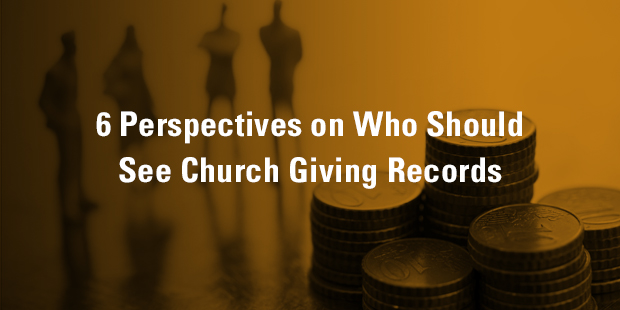
6 Perspectives on Who Should See Church Giving Records
by Thom Rainer | June 9, 2016It’s a difficult question. Indeed it is such a difficult question that I will not attempt to give a concrete answer.
-

5 Facts About Money in Large Churches
by Todd McMichen | May 23, 2016Recently we partnered with a leading church research firm to conduct a national survey of hundreds of churches exceeding 1,000 people in worship attendance. Below are some interesting financial learnings I want to pass on to you: 100% of large churches are engaging capital campaigns as a funding strategy.
-
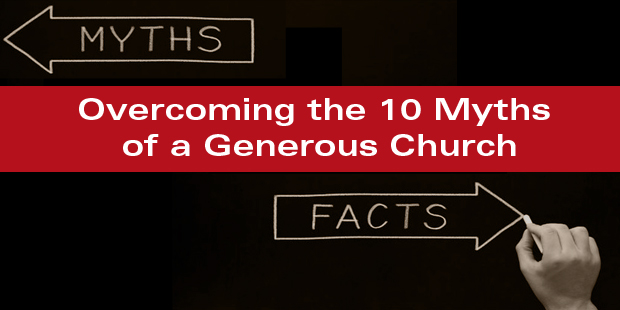
Overcoming the 10 Myths of a Generous Church
by Todd McMichen | April 5, 2016I constantly hear pastors bemoan why their church is not more generous. “Our people just don’t give enough” or “We aren’t a rich church” are the two most common replies I encounter.
-

9 Ways to Grow Generous Disciples
by Dan Reiland | April 1, 2016For every leader, it requires artful and prayerful leadership to inspire a congregation to give. That said, I know how much stress pastors and church leaders carry about church finances.
-

You Were Born to Be Generous
by Todd McMichen | February 29, 2016You can’t stop generosity. It is natural, normal, and wired into the existence of every human being.
-

The Most Powerful Impact on a Giver’s Money: Just Ask
by Dave Bair | February 25, 2016Right now, many pastors are asking how to increase giving this year. They have set their annual budgets, have planned for staff and expenses, and are anxiously watching the stock market and political news.
-

6 Givers Jesus Knew that We Should Know Too
by Todd McMichen | February 11, 2016Sharing stories of people doing both good and great things inspires others. When it comes to giving, people can often feel shame and inadequacy.
-

When Church Members Withhold Financial Gifts
by Thom Rainer | February 9, 2016The story is too common, but I hear such stories repeatedly. My most recent conversation was with a church leader where an affluent church member offered to make a large contribution to the renovation of the worship center.
-

The Secret to Overcoming Reluctance to Capital Campaigns
by Will Mancini | February 5, 2016Beginning today is a new series routinely posting content from one of the most innovative content sources in the church world: SUMS Remix Book Summaries for church leaders. SUMS Remix takes a practical problem in the church and looks at it with three solutions; and each solution is taken from a different book.
-

How to Move People from the Sidelines to Full Engagement in Your Next Capital Campaign
by Mike Gammill | February 3, 2016My first memory of a capital campaign forms the image of a 2×3 foot poster neatly taped to a wall with a hand-drawn thermometer on it. I was ten years old and my church was raising $50,000 (an inconceivable sum and thus an insurmountable goal) to “save the camp.
-
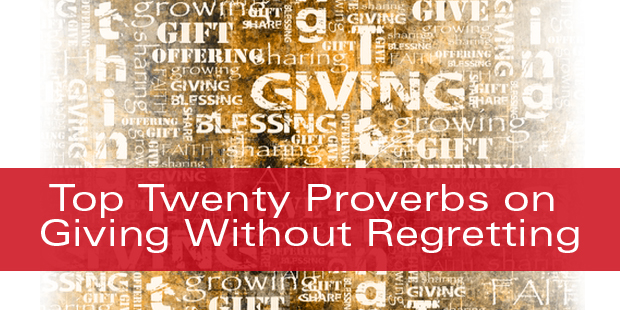
Top Twenty Proverbs on Giving Without Regretting
by Todd McMichen | December 25, 2015Christmas is the one time of the year when giving is on the forefront of everyone’s mind and possibly heart. You can witness it in the retailer raking it in, the mom preparing for guests, or the Salvation Army volunteer ringing that bell.
-

5 Questions to Help You Begin Tithing
by Jayson Bradley | December 18, 2015Whether it was because of a recent sermon series, the testimony of a friend,a convicting book, or even the Bible itself, you’re seriously considering regularly tithing to your local church. That’s great news.
-
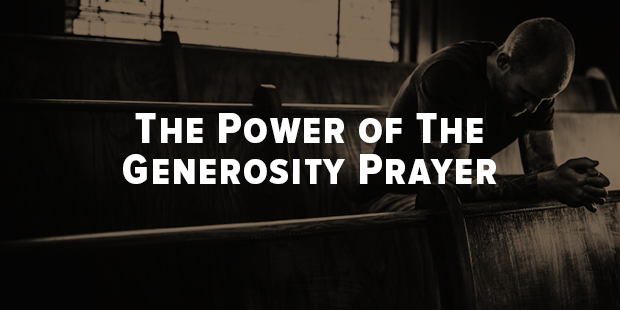
The Power of the Generosity Prayer
by Todd McMichen | December 11, 2015I know you’ve heard of “The Serenity Prayer“ which was said to be authored by Reinhold Niebuhr in the 1930′s or 1940′s. “God, grant me the serenity to accept the things I cannot change, the courage to change the things I can, and the wisdom to know the difference.
-

Going Old Testament with Your Tithe
by Derek Gillette | December 8, 2015When we think about tithing today, we often picture ourselves giving ten percent of our paycheck to a local church. Sometimes that involves making a donation through a mobile app, sometimes it’s dropping a check in the plate as it’s getting passed by.
-
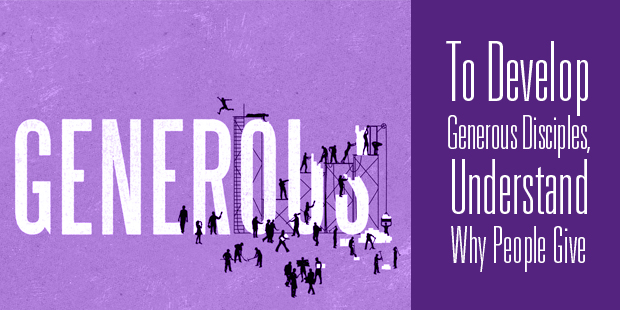
To Develop Generous Disciples, Understand Why People Give
by Rick Warren | December 2, 2015If you want your church to grow, you must learn how to motivate believers to invest their resources into the kingdom for ministry and for facilities. It is a key responsibility of leadership.
-

Why is Fund Raising Not Fun?
by Todd McMichen | November 16, 2015Most pastors do not realize that the professional fund raising industry for churches began to strongly establish itself in the 1970’s with the founding of a few key firms. Today, the foundation of the largest and most successful firms, along with several smaller and individually operated groups, still derive strategies from these initial firms.
-

5 Givers You Need to Know
by Todd McMichen | November 6, 2015I have been reading through the Bible this year and journaling about all things related to generosity. It has been an amazing journey as I have learned about the generous nature of God and how faithful He is.
-
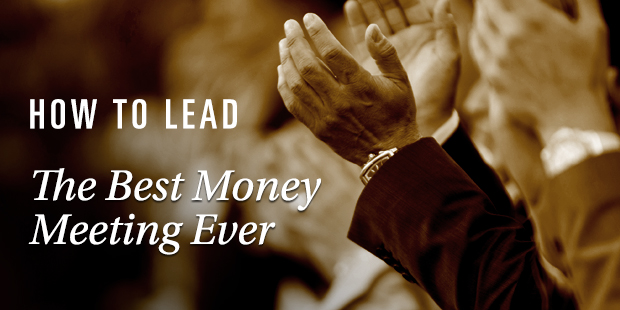
How to Lead the Best Money Meeting Ever
by Todd McMichen | October 30, 2015Recently I had the privilege of launching a Generosity Culture session with a pastor who is leading one of the most successful churches in his state. Over the years they have grown from a few hundred to thousands of people generating millions of annual income.
-

4 Lessons of Financial Health for the Pastor
by Todd McMichen | September 15, 2015I’ve had the privilege of founding two non-profit organizations, one for-profit company, and spent time as an employee of several multi-million dollar organizations. I also run the finances for my family.
-
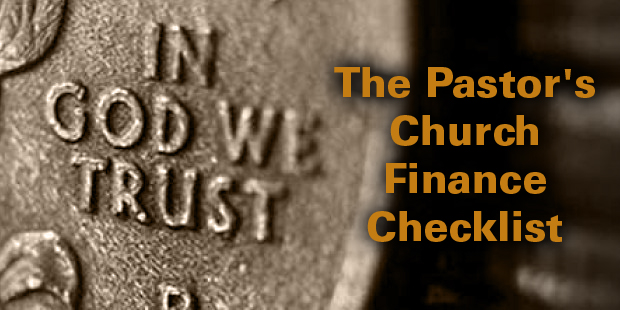
The Pastor’s Church Finance Checklist
by Thom Rainer | July 30, 2015A consistent theme I have seen in many churches is in the area of church finances. Many church leaders operate out of a mode of scarcity instead of abundance.
-

Leading Your Congregation to Invest in God’s 5 Funds
by Rick Warren | July 22, 2015Should Pastors ever talk about money? Only if you want to make disciples. What we worship shows in how we spend our time, our energy, and our money.
-

Good Doctrine Demands We Teach About Money
by Brandon Cox | July 16, 2015As a Pastor, I’m well aware of how many people have the assumption that “all Pastors want to talk about is money. ” The funny thing is, after twenty years in ministry and communicating regularly with thousands of pastors, I can firmly assert that talking about money is one of our least favorite things to do, especially in our culture where personal finances are very… personal.
-

Lifestyle Generosity: Christians & Tipping
by Thom Rainer | July 9, 2015The following is a true story. Granted, it happened several years ago.
-

5 Best Practices for Funding Your Mission
by David Putman | July 6, 2015Every Lead Pastor is responsible for financing the mission. As a Lead Pastor you have to own it.
-

4 Actions Pastors Need in Leading Their Church to Financial Breakthrough
by Todd McMichen | July 3, 2015I’ve had the privilege of founding two non-profit organizations, one for-profit company, and spent time as an employee of several multi-million dollar organizations. I also run the finances for my family.
-

4 Ways to Use Your Giving Time to Extend an Invitation
by Derek Gillette | July 1, 2015I visited a church recently. In between the worship and the Word, they did something called corporate prayer.
-

How Saddleback Church Models Transparency When Asking People to Give
by Rick Warren | June 30, 2015We’re right in the middle of our Daring Faith campaign at Saddleback and lives are already being changed in amazing ways! One element of this campaign is that we’re asking people to give to some really big goals. We’ve printed a brochure helping people to clearly understand every aspect of the campaign, and one section of that brochure is designed to help people have confidence when they give.
-

3 Ingredients Necessary When Pursuing True Generosity at Your Church
by Todd McMichen | June 25, 2015Pastors continually share with me their desire for a generous culture, but very few know what it really is and are willing to do the work to experience it. They tend to default toward doing nothing (except complaining) or executing yet another quick fix, short-term remedy.
-

Ransom Notes: When Givers Hold Your Church Hostage
by Thom Rainer | June 23, 2015Do you know any church members who have made demands based upon their financial giving to the church? Okay, that’s probably a rhetorical question because most of you readers certainly have experienced that discomfort. I asked a number of church leaders to share with me how this “hostage taking” usually takes place.
-

When Our Calling Isn’t Enough
by Derek Gillette | June 18, 2015Recently we had the privilege of participating in several church planting events, including ARC, Exponential East, and Stadia. The level of passion and enthusiasm we saw was unparalleled.
-

The Tension Between Technology and Faith
by Derek Gillette | June 11, 2015There’s a tension that exists sometimes when you talk about the relationship between technology and the church. A few months ago we wrote an article titled, “How Pastors Can Lead Their Church to Greater Year-End Giving.
-

The Power of the Preposition in Giving
by James Emery White | June 10, 2015Why do people give? That's easy. They give from the heart, to vision.
-

Stop Asking Millennials for Money
by Derek Gillette | April 29, 2015Drawing on the findings from research into giving by millennials here and here, I've compiled six traits of young givers that charities and non-profits would be wise to keep in mind as they look to engage with the $200b spending power of the Millennial generation: 1. We like to invest in ideas that actually make a difference Photos of starving children don’t stir us to donate, rather they stir us to care about fixing the root of the problem.











